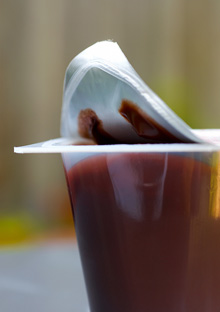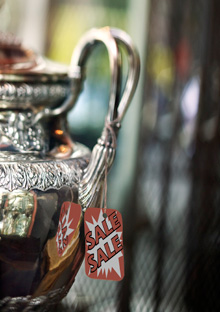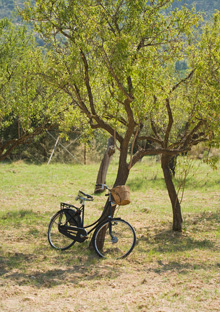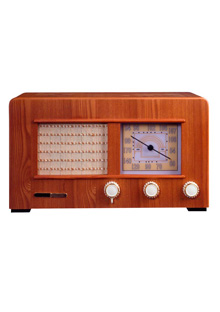What are the things that make you happiest—that don't involve a major transfer of currency? Six writers give us a new appreciation for ordinary pleasures, from supermarket pudding to zingy pop radio.
 Paradise. 17 Cents a Spoonful
Paradise. 17 Cents a SpoonfulFor Mark Leyner, it's a single sweet dollop of a pudding...
 Treasure Hunting
Treasure HuntingFor Gillian Fassel, Saturdays navigating estate sales...
 Two Wheels, No Waiting
Two Wheels, No WaitingFor Saïd Sayrafiezadeh, riding his trusty bike...
 Tuning In
Tuning InFor Caitlin Macy, listening to the radio...
 In My Element
In My ElementFor Farai Chideya, just being around water...
 Life on the Page
Life on the PageFor Jessica Helfand, collecting day-to-day memories in her scrapbook...
Read the essays »

© 2009 Jupiterimages Corporation
By Mark Leyner
It doesn't take a forensic psychiatrist to explain the origins of my obsessive love for pudding. For me, pudding is all about the polymorphic erotics of being fed. More than just a cheap thrill in tough times, pudding turns me into a baby bird waiting there, gape-mouthed, for some sweet, pre-chewed pabulum.What if you could condense the evolution of gastronomic pleasure from the very first mammalian sip of mother's milk to everything savored and swallowed over the millennia into one single alimentary act? Sound crazy? And, friends, I'm not talking about hot, steamy Christmas puddings, bread puddings, figgy puddings, crème brûlées, or zabagliones. I'm talking about the store-bought, ready-made pudding you find in the refrigerated section of your supermarket. I'm talking six plastic four-ounce cups of cold, thick, dizzyingly sweet pudding for around $2. I'm talking Swiss Miss. I'm talking Kozy Shack.
And actually, I've refined the act of pudding eating even further, down to its Eucharistic essence—a single spoonful. Two ounces. Seventeen cents' worth.
Here's how it's done: Scoop out a tablespoon of pudding from the plastic container (butterscotch is regarded by pudding illuminati as the epitome of flavors); put it in your mouth; do not move it around or disperse it in any way with your tongue; swallow the glob intact and let Mother Gravity slowly draw it down. Remember—this is as much about how it feels as it is about how it tastes.
Anticipation of that single sweet glob is the fuse that drives me through the day. A tablespoon of pudding is the perfectly titrated dose. It's a fugitive pleasure, swallowing a syllable. That sweet, thick syllable—pudd. The -ing is simply the slide down the throat, the pudd as it bids adieu... The parting of the pudding is all sweet sorrow.
A cowboy's shot of whiskey in a saloon sends the cowboy west, far from Mama, toward trouble, exile, and ultimately into the sunset. But the spoonful of pudding has a completely opposite vector. It sends you back, back east, back to Mama, toward the dawn, all the way to Eden...before the fall of mankind. Prelapsarian paradise at only 17 cents per glob! That's what I'm talking about.
Mark Leyner's most recent novel is The Tetherballs of Bougainville
.

© 2009 Jupiterimages Corporation
By Gillian Fassel
I am an estate-sale shopper—equal parts bargain hunter, recycler, voyeur—and I can conceive of no better way to spend a Saturday morning-into-afternoon than on the estate-sale circuit, armed with classified ads, Google maps, and a big, big latte. I've found, among other artifacts, a cache of 1950s Boy Scout memorabilia, a stalagmite shaped like an elephant's foot, a velvet-covered volume titled "Poetry in Costume." That last was a meticulously drawn history of women's fashion, from Grecian to Gibson girl, and its schoolgirl creator had pasted a letter from her teacher on one of its pages:"This is a beautiful book," the teacher wrote in May 1945. "I am sure it will be something to cherish and pass on to your children. It betrays your artistic nature and your gentle, beautiful character."
But her children did not cherish this book, and I can't resist imagining a novella to explain their heartlessness. Maybe, tragically, she outlived them. Or perhaps they just weren't the kind of people who get sentimental about objects, and when they came across this relic while cleaning out her attic, they thought, "What am I going to do with this old thing?" and tossed it in the "sell" pile.
And sell it they did, to me, for $8.
Sometimes I feel it's the least I can do to honor this stranger, to buy something her own family didn't deem worthy of saving but that she kept, for a reason strong and personal to her. And every time my 5-year-old daughter asks me to pull "Poetry in Costume" off the shelf so she can pore over the wonderful ladies and their lovingly rendered draperies, I'm reminded that the circle of life is also very much a circle of stuff, passing from one gentle, beautiful character to the next.
Gillian Fassel is a writer based in San Antonio.

© 2009 Jupiterimages Corporation
By Saïd Sayrafiezadeh
My bicycle prefers the errand. Indeed, it has no interest in tranquil rides through the park, around the pond, on to nowhere... It would die of boredom. No, on sunny afternoons it desires the post office, the grocery store, the library. This is when it is best able to display, conspicuously, its skill and dexterity and forthrightness. After all, who can surpass my bicycle when it comes to a span of ten blocks? Certainly not the foot, plodding clumsily to and fro. Nor the car, halted in traffic, panting with frustration, staring at us with envy as we pedal past. When we finally arrive back home at the end of the day with the sun setting, our basket will be full of the fruits of our journey. "Good boy," I will whisper to my bicycle, and I will rub its handlebars affectionately.Saïd Sayrafiezadeh's memoir is When Skateboards Will Be Free.

© 2009 Jupiterimages Corporation
By Caitlin Macy
I got a clock radio when I was 8 and experienced an immediate joy of connectedness that's never gone away. I'll listen to anything: country; Keillor; Communist chat. Indie college stations that play bands I've never heard of. Radio France International—the station of the Francophone diaspora—or the BBC. I get supper on the table to All Things Considered and clean up to a cheesy "Hits of Yesterday and Today" playlist.That you can cook and clean to the radio (and drive and dress and endure dental work) is to me central to the appeal of the dial. It's stimulating...but not coercively so. It's pleasurable, but, like tea to television's coffee, the addiction it incites is a mild one. Radio is not only wildly cheap, it's durably so: The machine I listen to now is not remarkably different from my clock radio of 30 years ago. Let your stereophilic husband have his fancy speakers and his subwoofer. Optimum sound quality is not the point of radio. For me, just listening is—tuning in, wherever I happen to be, to this private conversation that always includes me.
Caitlin Macy's new collection of stories is Spoiled.

© 2009 Jupiterimages Corporation
By Farai Chideya
Water has always shaped my memories: I can remember the times my sister would bring a plastic bucket down to the stream and catch crawfish. (We even had one as a pet for a while.) Recently we decided to paddle out on an ocean kayak tour, a flotilla of amateurs, struggling to stay on course. The swells grew high, and we both started to feel nervous. Then a humpback whale whooshed out of the water a hundred yards from us, sent spray flying, and dove back into the deep. Another awestruck paddler asked, "Why do they do that?" Our guide smiled and said, "If you weighed 30 tons and you could levitate out of the water, wouldn't you?" Renowned childen's advocate Marian Wright Edelman titled her recent book The Sea Is So Wide and My Boat Is So Small. For her, it's a metaphor; but Marian—I know how you feel.Farai Chideya's debut novel is Kiss the Sky.

© 2009 Jupiterimages Corporation
By Jessica Helfand
During the two years I researched my book about scrapbooks, I came across Zelda Fitzgerald's. It had this cacophony of odd, weird, disconnected moments—a review of one of Scott's plays, a picture of Zelda dressed as a clown—which is exactly what her life was. Anne Sexton kept firecrackers in hers. I found her scrapbook in a dusty box at the University of Texas at Austin. I felt as if nobody had ever looked at it. I travel everywhere with a little notebook, double-stick tape, and a date stamp. That's all you need. A few months ago a giant dragonfly, which had lived for a long time in my studio, dropped down on the table, dead. I was fascinated by its wings; they're so rarely—if ever—not in motion. I taped it into my sketchbook; it resembled a piece of delicate brown lace. I know some people don't trust their ability to express themselves in words, but if they grab something and paste it down in a scrapbook, they can make sense of their life as it changes. The gesture—not just saving something in a box but cementing it into place, saying, "I was here, this happened, here's the date"—that's really what it's all about.
Jessica Helfand is the author of Scrapbooks: An American History.




